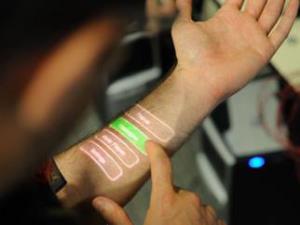



Date:27/04/20
 Researchers from Caltech have created a new electronic skin or e-skin that is applied directly to the top of the real skin on a person. The e-skin is made from a soft, flexible rubber material that can be embedded with sensors that monitor health information. Health information the sensor is capable of recording includes heart rate, body temperature, blood sugar, and metabolic byproducts that are indicators of health.
Researchers from Caltech have created a new electronic skin or e-skin that is applied directly to the top of the real skin on a person. The e-skin is made from a soft, flexible rubber material that can be embedded with sensors that monitor health information. Health information the sensor is capable of recording includes heart rate, body temperature, blood sugar, and metabolic byproducts that are indicators of health.
The wearable sensor can also record nerve signals that control muscles. The sensor runs solely on biofuel cells powered by the body’s waste product, sweat. The scientists say that human sweat contains very high levels of a chemical called lactate. Lactate is a compound generated as a byproduct of normal metabolic processes, especially by muscles during exercise.
The fuel cells built into the e-skin can absorb the lactate and combine it with oxygen from the atmosphere to generate water and pyruvate, which is another byproduct of metabolism. The biofuel cells can generate enough electricity to power sensors and a Bluetooth device similar to the type that connects a phone to a car stereo.
The team chose Bluetooth connectivity because it has extended connectivity for practical medical and robotic applications, even though it consumes more power than near-field communications. In addition to creating a power source that’s able to run on sweat, the team was also challenged by needing to create a sensor that can last a long time with minimal degradation. The file cells are made using carbon nanotubes pregnant with platinum/cobalt catalyst in a composite mesh that holds an enzyme able to break down lactate.
The fuel cells can generate continuous, stable power output as high as several milliwatts per square centimeter over multiple days using human sweat. The researchers plan to develop a variety of sensors that can be embedded in the e-skin allowed to be used for numerous purposes. The scientists intend this to be a platform and note that it could be used as a human-machine interface.
E-skin can monitor health indicators and is powered by sweat
 Researchers from Caltech have created a new electronic skin or e-skin that is applied directly to the top of the real skin on a person. The e-skin is made from a soft, flexible rubber material that can be embedded with sensors that monitor health information. Health information the sensor is capable of recording includes heart rate, body temperature, blood sugar, and metabolic byproducts that are indicators of health.
Researchers from Caltech have created a new electronic skin or e-skin that is applied directly to the top of the real skin on a person. The e-skin is made from a soft, flexible rubber material that can be embedded with sensors that monitor health information. Health information the sensor is capable of recording includes heart rate, body temperature, blood sugar, and metabolic byproducts that are indicators of health.The wearable sensor can also record nerve signals that control muscles. The sensor runs solely on biofuel cells powered by the body’s waste product, sweat. The scientists say that human sweat contains very high levels of a chemical called lactate. Lactate is a compound generated as a byproduct of normal metabolic processes, especially by muscles during exercise.
The fuel cells built into the e-skin can absorb the lactate and combine it with oxygen from the atmosphere to generate water and pyruvate, which is another byproduct of metabolism. The biofuel cells can generate enough electricity to power sensors and a Bluetooth device similar to the type that connects a phone to a car stereo.
The team chose Bluetooth connectivity because it has extended connectivity for practical medical and robotic applications, even though it consumes more power than near-field communications. In addition to creating a power source that’s able to run on sweat, the team was also challenged by needing to create a sensor that can last a long time with minimal degradation. The file cells are made using carbon nanotubes pregnant with platinum/cobalt catalyst in a composite mesh that holds an enzyme able to break down lactate.
The fuel cells can generate continuous, stable power output as high as several milliwatts per square centimeter over multiple days using human sweat. The researchers plan to develop a variety of sensors that can be embedded in the e-skin allowed to be used for numerous purposes. The scientists intend this to be a platform and note that it could be used as a human-machine interface.
Views: 1112
©ictnews.az. All rights reserved.Similar news
- The mobile sector continues its lead
- Facebook counted 600 million active users
- Cell phone testing laboratory is planned to be built in Azerbaijan
- Tablets and riders outfitted quickly with 3G/4G modems
- The number of digital TV channels will double to 24 units
- Tax proposal in China gets massive online feedback
- Malaysia to implement biometric system at all entry points
- Korea to build Green Technology Centre
- Cisco Poised to Help China Keep an Eye on Its Citizens
- 3G speed in Azerbaijan is higher than in UK
- Government of Canada Announces Investment in Green Innovation for Canada
- Electric cars in Azerbaijan
- Dominican Republic Govt Issues Cashless Benefits
- Spain raises €1.65bn from spectrum auction
- Camden Council boosts mobile security





















